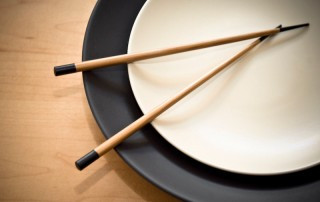Chinese phrases that reveal aspects of Chinese culture
Here are some everyday Mandarin Chinese phrases that reveal parts of the still distinctive culture despite western influences. If you know and understand these Chinese phrases you are already well on your way to small talking in China.
1. 不用客气。(bùyòng kèqì.) No need to be polite.
If someone in China buys or does something for you, especially if it’s to make you feel welcome you shouldn’t say thank you. Saying thank you too much to a lot of people in China makes it seem like you aren’t real friends because you need to be formal with them. This confuses many foreigners when they have been bought a very big meal at a fancy restaurant (a typical occurrence) and they want to thank the host for being so kind only for the host to look a little annoyed and say: Don’t be so polite! We’re friends!
If someone in China does something to welcome you, don’t say thank you! This shows you’re real friends [Tweet this]
2. 你吃饭了吗?(nǐ chīfàn le ma?) Have you eaten? 
This is often used when greeting someone (often around meal times) to show empathy for the other person, though it’s not necessarily an offer to buy or make dinner.
It comes from the olden days when most of the population were farmers and lived extremely tough lives, struggling for food from day to day. Therefore the most considerate thing to ask somebody when you met them was: have you eaten?
This ties in well with the way Chinese people like to have their guests eat and drink as much as possible in order to make them feel welcome, often buying twice the amount of food needed to make their guests completely full.
Chinese people like their guests to eat and drink a lot to make them feel welcome, often buying 2x the amount actually needed [Tweet this]
3. 慢慢吃。(màn man chī.) Eat slowly.
With six different cuisines, food is a very important part of Chinese culture. While eating, people will often tell you to “Eat slowly“, especially hosts. The idea is that by eating slower you enjoy your meal more. Carrying on from the above the more you eat and drink the more you accept your host’s generosity. However, there is a balance to maintain; if the guest eats too much and there isn’t much food left the host will provide more food as they are: “afraid the guest isn’t full“.
4. 你可以找我玩儿!(nǐ kěyǐ zhǎo wǒ wáner!) You can find me to play!
This means you can contact me and we can go out and do something enjoyable together. It has no other connotations! The Chinese word for play has another meaning: to do something for leisure, so if someone asks you if you want to play they aren’t being childish, they just want to do something enjoyable with you.
5. 没事。(méishì.) No big deal (It’s nothing).
This is a very common Chinese phrase, perhaps you apologise to someone and they tell you: it’s nothing. Someone falls over and you ask 你没事吧?(nǐ méishì ba?) – You no big deal right? (Are you OK?). Or perhaps someone is worried about you, then you can tell them: It’s nothing!
6. 戴绿帽子。(dài lǜ màozi.) To wear a green hat.
This Chinese phrase comes from an old story, in which a lonely wife of a businessman starts being unfaithful to him with a cloth merchant every time he goes away on business trips. The cloth seller is almost caught once when he sees the business man on his way out of town to go hunting and mistakenly thinks he is going on another business trip.
He goes to the house to meet the wife again, but to the complete surprise of both the cloth merchant and the wife, the husband returns early. The cloth merchant quickly hides under the bed until the next day when he manages to sneak out.
After that the wife has the cloth merchant make her a green hat which she says she will give to her husband every time he goes away for business in order for the cloth merchant to know that he can come and see her.
The next time her husband is planning to go away she quickly goes and gets the green hat, saying there is a strong wind blowing the sand outside, so he needs to stop the sand getting into his hair and that the green makes him look particularly handsome.
So if a man is wearing a green hat in China it means his wife is cheating on him, making a green hat one of the worst possible gifts.
Never give a green hat to someone: in China if a man wears a green hat it means his wife is cheating [Tweet this]
If you can’t get enough of these Chinese sayings that help you get some insight into Chinese culture, head over to these 10 Wise Chéngyǔ to Make You Sound Like Confucius or 7 ways in which learning Chinese will turn your world upside down.
By Maxwell Troy-O’Donovan
Discover China & Chinese Culture Yourself
